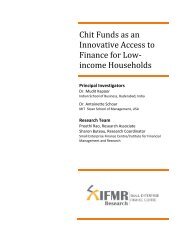Government of India Volume I: Analysis and Recommendations
Government of India Volume I: Analysis and Recommendations
Government of India Volume I: Analysis and Recommendations
You also want an ePaper? Increase the reach of your titles
YUMPU automatically turns print PDFs into web optimized ePapers that Google loves.
MONETARY POLICY<br />
The staff <strong>of</strong> the central bank report to the head <strong>of</strong> the central bank <strong>and</strong> face obvious<br />
conflicts <strong>of</strong> interest in voting independently. Additionally, having multiple members from<br />
one organisation raises the possibility <strong>of</strong> group-think. These concerns are addressed by<br />
having five external members on the MPC. However, ultimately it is the head <strong>of</strong> the central<br />
bank who must be held responsible for delivering on the monetary policy objectives.<br />
The accountability mechanisms (described ahead) would ultimately rest with the<br />
head <strong>of</strong> the central bank. Hence, under extreme circumstances, the head <strong>of</strong> the central<br />
bank has the power to override the MPC. However, this would have to be accompanied<br />
by a letter to the Central <strong>Government</strong>, which would be released into the public domain,<br />
explaining why he/she feels that the MPC is exceptionally incorrect in its assessment, thus<br />
justifying an exceptional bypassing <strong>of</strong> the MPC.<br />
Under normal conditions, monetary policy can generally be conducted using only<br />
one instrument, the control <strong>of</strong> the short-term policy rate. Occasionally, there may be a<br />
need to use other instruments, such as ‘quantitative easing’, or, trading on the currency<br />
market, or, capital controls. 1 The framework envisaged by the Commission is unified in<br />
its approach: All powers <strong>of</strong> monetary policy should be wielded in the pursuit <strong>of</strong> well defined<br />
objectives established by the Central <strong>Government</strong>, <strong>and</strong> all exercise <strong>of</strong> these powers<br />
should be done by voting at the MPC.<br />
The structure <strong>and</strong> functioning <strong>of</strong> the MPC is summarised in Table 11.2.<br />
11.5. Accountability<br />
Alongside the definition <strong>of</strong> the monetary policy objectives <strong>of</strong> the central bank, the Statement<br />
<strong>of</strong> the Central <strong>Government</strong> that establishes the objective <strong>of</strong> monetary policy would<br />
clearly define what constitutes a substantial failure to achieve monetary policy objectives.<br />
If such an event should arise, the head <strong>of</strong> the central bank would have to: (a) write a<br />
document explaining the reasons for these failures; (b) propose a programme <strong>of</strong> action;<br />
(c) demonstrate how this programme addresses the problems that have hindered the<br />
achievement <strong>of</strong> the target(s); <strong>and</strong> (d) specify a time horizon over which the MPC expects<br />
the target to be achieved.<br />
A further check is envisaged in the form <strong>of</strong> a reserve power granted to the Central<br />
<strong>Government</strong> to issue directions to the central bank on issues <strong>of</strong> monetary policy under<br />
certain extreme circumstances. Given the drastic nature <strong>of</strong> this power, any direction under<br />
this power must be approved by both Houses <strong>of</strong> Parliament <strong>and</strong> can be in force only<br />
for a period <strong>of</strong> three months. Such direction may be issued in consultation with the head<br />
<strong>of</strong> the central bank.<br />
11.6. Institutional structure<br />
11.6.1. Board <strong>of</strong> the central bank<br />
The board <strong>of</strong> the central bank would oversee the functioning <strong>of</strong>: (a) monetary policy; (b)<br />
micro-prudential <strong>and</strong> consumer protection functions for banking; <strong>and</strong> (c) micro-prudential<br />
<strong>and</strong> consumer protection functions for payments. The Chairperson <strong>and</strong> the board<br />
would ultimately be responsible for continually reforming the organisation so as to deliver<br />
on its objectives as defined in the draft Code. Decision-making about organisational<br />
<strong>and</strong> institutional arrangements would take place at the board.<br />
1 The Commission envisages that the central bank will frame regulations on outbound capital flows, in consulta-<br />
tion with the <strong>Government</strong>.<br />
FINANCIAL SECTOR LEGISLATIVE REFORMS COMMISSION 107



